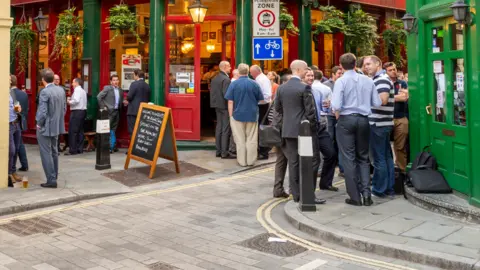In a recent discussion among peers in the House of Lords, the trend of after-work drinks—specifically outside of London—has been highlighted as declining significantly. This revelation comes on the heels of testimony from urban economist Paul Swinney, who serves as the director of the Centre for Cities think tank. The discussion focused on the impact of remote and hybrid working arrangements on drinking patterns in urban areas. Swinney noted that while London has experienced some changes in the timing of after-work drinking, other major cities across the UK are seeing a stark decline in post-work socialization.
According to Swinney’s analysis, which drew from spending data, the pattern in the capital is somewhat optimistic. He indicated that after-work drinks in London have transitioned from a typical Friday night affair to a Thursday evening outing. This shift has made Thursday the “most popular night” for pub-goers in central London. However, this pattern stands in contrast to other large British cities, where the data suggests a decrease in after-work spending at bars and pubs. Instead of experiencing a similar shift, these cities have shown an inclination for continued drinking into the weekend, indicating a preference for leisure-driven outings rather than after-work socializing.
The evidence presented by Swinney was derived from a comprehensive study that compared pre-pandemic and post-pandemic spending habits of city-centre workers at pubs and bars, using credit and debit card data from 2019 and the current year, 2024. The results reflect a significant divergence between London and other cities, including Glasgow, Liverpool, Bristol, Newcastle, and Sheffield. Notably, Fridays are now being favored as the day most workers choose to work from home, which has contributed to the observed decrease in post-work bar patronage.
As Swinney elaborated during his testimony, the decline in city-centre spending on drinks has not seen a compensating rise in expenditure at local high streets in these urban centers. This led to the conclusion that while some level of spending might have shifted to more suburban areas, it has not occurred to the extent that some predicted during the pandemic era. Interestingly, he remarked that suburban supermarkets and local vendors appear to be the biggest beneficiaries of this shift in consumer spending routines since the onset of COVID-19.
Additionally, the data showcased that Saturday has become a major day for spending on drinks in larger cities outside London, with 32% of weekly pub expenditure occurring on this day. This change indicates a shift in consumer behavior; city dwellers are opting for social outings on weekends rather than during the workweek. Thus, it paints a picture of workers gravitating toward leisure activities, likely in a more relaxed, non-work context, as opposed to traditional post-work drinks.
When discussing the broader implications of these shifts, Swinney concluded by addressing the potential long-term consequences for economic productivity. While immediate benefits of flexible working—such as reduced commuting costs and greater schedule adaptability—are apparent for workers, it is suggested that a comprehensive assessment of their impact on the economy could take considerable time. Predictions range from two to upwards of ten years before a clear understanding emerges of how these patterns will affect cities and local economies in the long run.
Consequently, these findings underline a transformative moment in work and socialization dynamics within major urban centers across the UK. The decline of after-work drinks outside London raises critical questions about the future of urban life post-pandemic, underlining the need for local governments and businesses to adapt to the evolving lifestyles of workers. The traditional landscape of post-work socializing may need reimagining as hybrid and remote working patterns continue to manifest across the nation.



